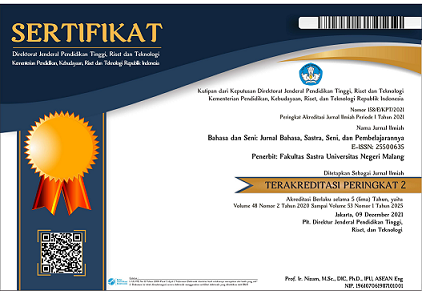A POSTMODERN UNDERSTANDING OF TONI MORRISON’S SULA
Abstract
Postmodern fiction has unique features that distinguish its works from other works of fiction. It often blurs literary genres and break conventional narration. Tony Morrison’s novel titled Sula, a work that has triggered some critical work, is consid- ered as one of prime texts of this fiction. This article is a report on an investigation of the postmodern features of Morison’s Sula. It is a descriptive qualitative method using the narration and conversation among the characters. It showed that the novel starts with the paradox and ambiguity in the beginning. The author is able to judge the eth- ical or moral ramifications and decipher Sula in either an evil or a good person. It also criticizes patriarchy institution, gender displacement, and associative ambiguity
Full Text:
PDFRefbacks
- There are currently no refbacks.

This work is licensed under a Creative Commons Attribution 4.0 International License.

Dear Sir/Madam
We appreciate your continued confidence and trust in Bahasa dan Seni: Jurnal Bahasa, Sastra, Seni, dan Pengajarannya (JBS). In order to enhance the service, readability, and quality of JBS publications, we will be transitioning to a new website, https://citeus.um.ac.id/jbs, in collaboration with Digital Commons (Elsevier) starting in July 2024.
Sincerely
Yusuf Hanafi
(Editor in chief)















2.png)